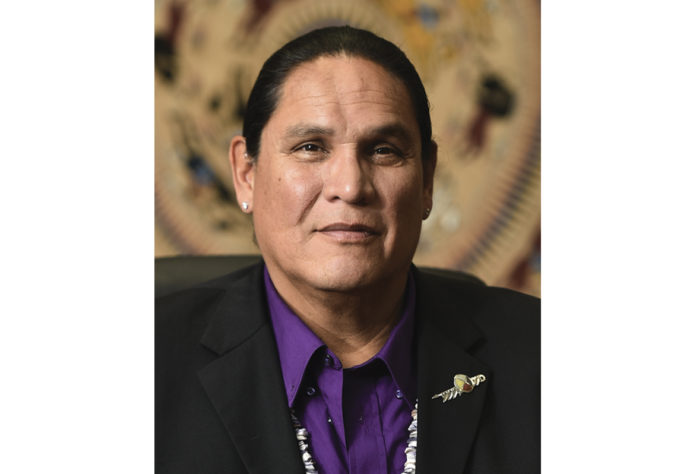Now It’s Time to Come Together to Heal Our Country
by Ernest L. Stevens, Jr.
It’s 2020, so we knew it would not be easy. Election night turned to weeks as votes continued to be counted. It is clear that former Vice President Joe Biden will be the 46th President of the United States, Democrats will retain control of the House of Representatives – with a smaller majority, and control of the U.S. Senate will remain undecided until January 2021.
Nationwide voter turnout was the highest in more than a century. When all votes are counted, more than 160 million Americans will have cast a ballot in 2020. At 67 percent of the electorate, this is the highest turnout level since 1900. What’s even more amazing is Americans cast these votes in the midst of a pandemic.
Adding to the history, six Native voices will serve and be heard when the 117th Congress is sworn into office in January of 2021: more than any Congress in recent history.
All four current Native Members of Congress were reelected, including longstanding Republican Representatives Tom Cole (Chickasaw) and Markwayne Mullin (Cherokee). The first two Native women to serve in Congress, both Democrats, Deb Haaland (Laguna Pueblo) and Sharice Davids (Ho Chunk), were also reelected by wide margins.
Among the two new Native faces joining them will be Representative Elect Kai Kahele (D-HI), who will be only the second Native Hawaiian to serve in Congress since Hawaii’s statehood. He walks in the footsteps of the great Senator Daniel Akaka, who also served as Chairman of the Senate Committee on Indian Affairs. In addition, Representative Elect Yvette Herrell (R-NM)(Cherokee) won her first term in office to serve New Mexico’s Second Congressional District. Herrell, a former State Representative, becomes part of the first state to send an all female congressional delegation to Congress. These three Democratic Representatives and three Republican Representatives reflect the diversity of Indian Country’s heritage and our politics.
Let there be no doubt that Indian Country played a crucial role in pivotal states in this election. The National Indian Gaming Association’s “My Vote WILL Count” campaign made several stops in the key states of Michigan, Minnesota, Nebraska, and of course Wisconsin – taking all social distancing and safety precautions. We also partnered remotely and virtually with our Member Tribes and sister tribal organizations to get out the vote throughout Indian Country, all while regularly sending out packages of sealed and sanitized unite the vote t-shirts, which remain a hot item even today.
While some outlets attempted to dismiss the Native vote by lumping us into a racial category referred to a “something else,” Indian Country’s voice was heard loud and clear in this election, and was truly, powerfully, and exceptionally something else. I was humbled and energized to see our young men and woman warriors step up within their communities, reaching out, educating, registering, and doing everything within their power to and help all Native Americans exercise their sacred voting rights.
Our My Vote WILL Count campaign pushed for the non-partisan policy goals that all of Indian Country supports: working to ensure that the U.S. respects tribal government sovereignty, honors the treaty and trust obligations, invests in improvements to Indian health care, education, and public safety, and protects our voting rights. When we exercise our voting rights, these issues get elevated on a national level, and thanks to our Indian Country outreach, I believe we reached this first goal.
It is now time to get to work to take the next step: turning these policy ideas into laws and action. However, achieving our next goal will not come easily. While control of the Senate remains in play, the results of the election will likely produce another divided Congress. That is why our constant advocacy on both sides of the aisle will play an important role in this next Congress. But America cannot remain divided. Our Nation continues to battle the most significant threat to our health, safety, and economy in more than a century. We must come together.
In his acknowledgement on November 7th, President Elect Biden pledged to unify the Nation. Mr. Biden acknowledged the broad and diverse coalition that came together to put him in office, and he sought to begin the process of bridging America’s divides.
I was humbled and energized to see our young men and woman warriors step up within their communities, reaching out, educating, registering, and doing everything within their power to and help all Native Americans exercise their sacred voting rights.
Reaching out to those who did not vote for him, Biden said that it is now time to “give each other a chance…to lower the temperature. To see each other again. To listen to each other again.” Also stating, “I pledge to be a president who does not see red or blue states, but United States.”
Biden promised that his Administration will focus first on defeating COVID-19. “We cannot repair the economy, restore our vitality, or relish life’s most precious moments – hugging a grandchild, birthdays, weddings, graduations, all the moments that matter most to us – until we get this virus under control. I will spare no effort – or commitment – to turn this pandemic around.”
President Elect Biden also took head on the need to come together and compromise. Biden stated that:
“The refusal of Democrats and Republicans to cooperate with one another is… a decision…. And if we can decide not to cooperate, then we can decide to cooperate. I believe that this is part of the mandate from the American people. They want us to cooperate. That’s the choice I’ll make. And I call on the Congress, Democrats and Republicans alike, to make that choice with me.”
This was the longest election cycle in recent memory. Candidates at all levels of government fought hard for every vote. But now is the time to get to work. COVID-19 continues to devastate the health and economic future of Indian Country at disparate levels. Congress must heed Mr. Biden’s call to come together to advance a coronavirus relief package that provides tools to all tribal, state, and local governments to finally defeat the virus and move our communities forward.
Ernest L. Stevens, Jr. is Chairman of the National Indian Gaming Association (NIGA). He can be reached by calling (202) 546-7711 or visit www.indiangaming.org.













































